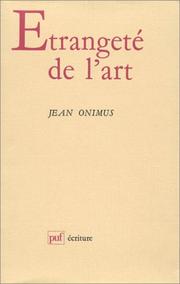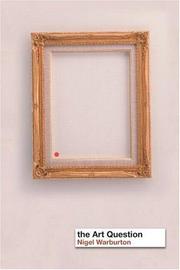| Listing 1 - 10 of 344 | << page >> |
Sort by
|

ISBN: 3518291777 9783518291771 Year: 2002 Publisher: Frankfurt am Main Suhrkamp
Abstract | Keywords | Export | Availability | Bookmark
 Loading...
Loading...Choose an application
- Reference Manager
- EndNote
- RefWorks (Direct export to RefWorks)
Book
ISBN: 9782343034997 2343034990 Year: 2014 Volume: *2 Publisher: Paris L'Harmattan
Abstract | Keywords | Export | Availability | Bookmark
 Loading...
Loading...Choose an application
- Reference Manager
- EndNote
- RefWorks (Direct export to RefWorks)
Comment rencontrer l'art, aujourd'hui, dans notre monde en mutation et dont le sens échappe à la raison ? La pensée logique traditionnelle devient insuffisante. Le goût, le style, l'invention, la créativité...restent des notions vaines, inadéquates. Une autre pensée se cherche à travers l'expérience de l'artiste créateur. Il s'agit d'une migration dans un ailleurs irrationnel qui remet en cause la notion d' " Art contemporain", ce dont témoigne abondamment l'exposition Van Gogh/Artaud, au musée d'Orsay, en 2014.
Art --- Philosophy --- Art - Philosophy

ISBN: 2130448526 9782130448525 Year: 1992 Publisher: Paris : PUF,
Abstract | Keywords | Export | Availability | Bookmark
 Loading...
Loading...Choose an application
- Reference Manager
- EndNote
- RefWorks (Direct export to RefWorks)
Art --- Philosophy. --- Art - Philosophy.
Book
ISSN: 02497913 ISBN: 9782711626687 2711626687 Year: 2016 Publisher: Paris : Vrin,
Abstract | Keywords | Export | Availability | Bookmark
 Loading...
Loading...Choose an application
- Reference Manager
- EndNote
- RefWorks (Direct export to RefWorks)
Comment reconnaissons-nous une œuvre d’art? Sur quel système implicite notre discours sur les arts est-il fondé? Comment classer des objets artistiques de plus en plus complexes et hétérogènes? Pouvons-nous encore parler d’un système des arts aujourd’hui? Pour répondre à ces questions, Giuseppe Di Liberti propose ici, à partir de la théorie générale des systèmes, une reformulation originale du système des arts, capable d’accueillir le défi théorique lancé par la complexité des pratiques artistiques contemporaines. L’ouvrage trace d’abord une histoire des classifications et des systèmes des beaux-arts de l’Antiquité au XXe siècle et s’offre ainsi comme la reconstruction historique la plus complète actuellement sur ces notions majeures de l’esthétique. Si les instances des avant-gardes ont pointé une crise profonde du système des beaux-arts, le débat des années vingt autour de la systématique des concepts fondamentaux de l’histoire de l’art – notamment les propositions de Dessoir, Panofsky et Wind – donne le socle théorique de l’hypothèse conclusive. Le système des arts peut aujourd’hui être pensé comme un système ouvert d’idées, un outil critique rigoureux face à la diversité des phénomènes artistiques, un “sens commun” pour bâtir notre expérience des œuvres d’art.
Art --- Philosophy --- Art - Philosophy
Book
ISBN: 9789062831982 9062831982 Year: 2000 Publisher: Bussum Coutinho
Abstract | Keywords | Export | Availability | Bookmark
 Loading...
Loading...Choose an application
- Reference Manager
- EndNote
- RefWorks (Direct export to RefWorks)
Aesthetics --- Art - Philosophy --- Art

ISBN: 9780415174909 0415174899 9780415174893 0415174902 Year: 2008 Publisher: London Routledge
Abstract | Keywords | Export | Availability | Bookmark
 Loading...
Loading...Choose an application
- Reference Manager
- EndNote
- RefWorks (Direct export to RefWorks)
Aesthetics --- Art - Philosophy. --- Art
Book
ISBN: 1472574281 9781472574282 Year: 2019 Publisher: London: New York: Oxford: New Delhi: Sydney: Bloomsbury Academic,
Abstract | Keywords | Export | Availability | Bookmark
 Loading...
Loading...Choose an application
- Reference Manager
- EndNote
- RefWorks (Direct export to RefWorks)
Since the latter half of the 20th century, committed art has been associated with conceptual, critical and activist practices. Painting, by contrast, is all too often defined as an outmoded, reactionary, market-led venture ; an ineffectual medium from the perspective of social and political engagement. How can paintings change the world today? The question of painting, in particular, fuelled the investigations of a major 20th-century philosopher: the French phenomenologist, Maurice Merleau-Ponty (1907-61). Merleau-Ponty was at the forefront of attempts to place philosophy on a new footing by contravening the authority of Cartesian dualism and objectivist thought-an authority that continues to limit present-day intellectual, imaginative, and ethical possibilities. A central aim of The Question of Painting is to provide a closely focused, chronological account of his unfolding project and its relationship with art, clarifying how painting, as a paradigmatically embodied and situated mode of investigation, helped him to access the fundamentally "intercorporeal" basis of reality as he saw it, and articulate its lived implications. With an exclusive and extended conversation about the contemporary virtues of painting with New York based artist Leah Durner, for whom the work of Merleau-Ponty is an important source of inspiration, The Question of Painting brings today's much debated concerns about the criticality of painting into contact with the question of painting in philosophy
Art - Philosophy --- Aesthetics --- Painting
Book
ISBN: 9782841031641 2841031640 Year: 2008 Publisher: Antibes William Blake and Co
Abstract | Keywords | Export | Availability | Bookmark
 Loading...
Loading...Choose an application
- Reference Manager
- EndNote
- RefWorks (Direct export to RefWorks)
Art --- Philosophy --- Congresses --- Art - Philosophy - Congresses --- Art - Philosophy
Book
ISSN: 13582461 ISBN: 9781107661745 1107661749 Year: 2013 Volume: 71 Publisher: Cambridge Cambridge University Press
Abstract | Keywords | Export | Availability | Bookmark
 Loading...
Loading...Choose an application
- Reference Manager
- EndNote
- RefWorks (Direct export to RefWorks)
Aesthetics --- Art --- Philosophy --- Art - Philosophy
Book
ISBN: 9780199694822 0199694826 Year: 2014 Publisher: Oxford Oxford university press
Abstract | Keywords | Export | Availability | Bookmark
 Loading...
Loading...Choose an application
- Reference Manager
- EndNote
- RefWorks (Direct export to RefWorks)
Hegel gave lecture series on aesthetics or the philosophy of art in various university terms, but never published a book of his own on this topic. His student, H. G. Hotho, compiled auditors' transcripts from these separate lecture series and produced from them the three volumes on aesthetics in the standard edition of Hegel's collected works. Annemarie Gethmann-Siefert has now published one of these transcripts, the Hotho transcript of the 1823 lecture series, and accompanied it with a very extensive introductory essay treating many issues pertinent to a proper understanding of Hegel's views on art. She persuasively argues that the evidence shows Hegel never finalized his views on the philosophy of art, but modified them in significant ways from one lecture series to the next. In addition, she makes the case that Hotho's compilation not only concealed this circumstance, by the harmony he created out of diverse source materials, but also imposed some of his own views on aesthetics, views that differ from Hegel's and that the ongoing interpretation of the aesthetics part of Hegel's philosophy has unfortunately taken to be Hegel's own. This translation of the German volume, which contains the first publication of the Hotho transcript and Gethmann-Siefert's essay, makes these important materials accessible to the English reader, materials that should put the English-speaking world's future understanding and interpretation of Hegel's philosophy of art on a sounder footing.
Aesthetics --- Art --- Philosophy --- Art - Philosophy
| Listing 1 - 10 of 344 | << page >> |
Sort by
|

 Search
Search Feedback
Feedback About UniCat
About UniCat  Help
Help News
News